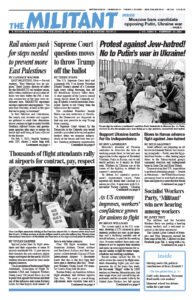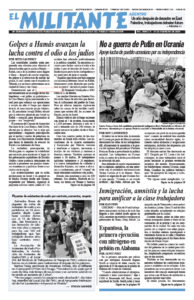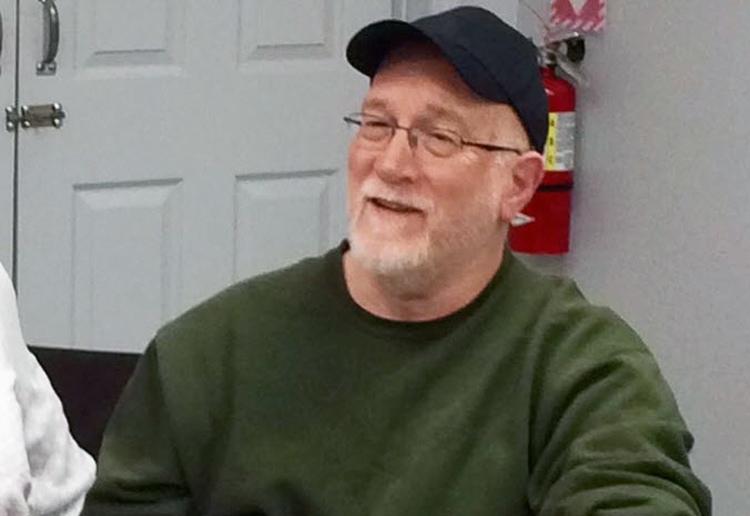ATLANTA – A meeting to celebrate the political life and contributions of Bruce Kimball, a member and later a supporter of the Socialist Workers Party for more than 50 years, was held here Feb. 4. Kimball died of cancer Jan. 21 at 76.
Susan LaMont, organizer of the Atlanta SWP branch, welcomed the 54 participants. SWP members, supporters and friends from Atlanta, the region and around the country, as well as family, neighbors, friends and co-workers of Kimball and his companion and comrade Sarah Harris attended.
LaMont said the party is on the front lines in working-class struggles today — in the fight against Jew-hatred and defending Israel’s right to exist as a refuge for Jews; in defense of the Ukrainian people fighting for their independence against Moscow’s invasion; to defending constitutional freedoms under attack, as well as today’s union struggles.
In the early 1970s, Kimball joined the SWP in Cleveland. He was in his early 20s, LaMont said. He was impacted by Cuba’s socialist revolution, led by Fidel Castro; the mighty struggles for Black rights that brought down Jim Crow segregation; the rise of Malcolm X as a leader of the working class; and the growing fight against Washington’s war in Vietnam.
Won to SWP’s historical continuity
“He was won to the SWP — to its course of action, integrity and its historical continuity going back to the 1917 Russian Revolution, led by V.I. Lenin, and the fight led by Leon Trotsky to defend that course against Stalinism,” LaMont said
New members like Kimball worked with veterans of the political and labor battles of the 1930s and ’40s who were active in the Cleveland SWP branch, and in the party nationally, she said.
LaMont explained how Kimball became a Marxist and party cadre, taking on whatever assignments — wherever he was needed — to work to expand the reach of the party. He joined in building party branches and in labor and political struggles as the working class moved to the center stage of U.S. politics in the late 1970s.
After Cleveland, Kimball moved to San Antonio, Texas, and became involved in the growing struggles by Chicanos for social justice, including for a political break with the Democrats and Republicans.
“SWP members, both male and female, began to get jobs in industry, including in the coal mines. Bruce was one of them,” LaMont said. He moved to St. Louis and became part of the United Mine Workers’ battles against the coal bosses in the southern Illinois coalfields.
In written greetings to the meeting, Jonathan Silberman, a leader of the Communist League in the United Kingdom, recalled Kimball’s 1984 visit to bring solidarity to coal miners there. “He came just a couple of weeks after 150,000 coal miners here walked out in a fight over jobs — the start of what was to become a yearlong strike by the National Union of Mineworkers,” he wrote. Kimball toured U.S. coalfields after his return, speaking at Militant Labor Forums about the British miners’ fight.
“What became known as the ‘international coal project’ was decisive to the forging of the Communist League as a proletarian party,” Silberman said.
Kimball also built party branches in Austin, Minnesota, where he worked as a meatpacker, and in Greensboro, North Carolina, where he was a member of the Amalgamated Clothing and Textile Workers Union at a large mill.
Kimball becomes a party supporter
In the early 2000s Kimball quit his party membership, and he and Harris moved to Atlanta. A few years later he decided to become an organized party supporter. Over the next 20 years he took on responsibilities at the Pathfinder distribution center here in Atlanta, which is organized by a team of supporters under party leadership.
Holly Harkness, organizer of the distribution center, told the meeting the supporters’ auxiliary is a leveraged political conquest of the party with nearly 250 supporters worldwide. They take manuscripts prepared by the party leadership and organize to get the books prepared, printed and shipped. They keep in print more than 400 titles in 11 languages, books spanning more than 150 years of communist class struggle, history and program.
“This body of work is the program and continuity essential to building communist parties worldwide,” Harkness said.
She pointed out the impetus for the project hadn’t been a technical one, but political. It was the SWP’s response to a sea change in the working class in the early 2000s, a new mood and growing confidence among workers after decades of retreat. Many party supporters, who were unorganized at the time, said, “We want to help. Organize us!”
Jim Rogers, another leader at the distribution center, described the high standards and competence Kimball and other volunteers maintain, and his satisfaction in working collectively to accomplish something so important for the party.
Written messages came from members and supporters around the country, as well as from Canada, the U.K. and Australia. Many described Kimball’s serious, but easy-going manner, his ready sense of humor, his patient, helpful way of working with people, a reflection of his confidence in the working class.
Tom Embry, a former co-worker and long-time friend of Kimball and Harris, asked to give greetings to the meeting. “Even after we both quit the job where we met,” he said, “we stayed friends. I learned to appreciate Bruce’s honesty, his values, as well as his broad cultural interests, which ranged from jazz to the arts, to computers. He was also a fan of cricket and sumo wrestling.”
“We are celebrating the decisive place of building a proletarian party amidst great revolutionary struggles to end capitalist rule that will come out of its uncontrollable social crises, convulsions, and wars of the imperialist epoch,” SWP National Committee member Dave Prince told the meeting.
“We are living through great turning points in history, big shifts in U.S. and world politics,” he said. “Bruce followed these closely until the end of his life.”
Prince said Kimball became a supporter, based on his political support for the party’s program, loyalty to its course and determination to help. That commitment to work by the supporters allows the party to be significantly stronger in what it does today.
“In 1991,” Prince said, “the party noted the first Gulf War in Iraq announced the opening guns of World War III, that U.S. imperialism had lost the Cold War. This meant that the ‘world order’ born out of Washington’s victory in World War II was beginning to come apart. U.S. imperialism will go down as the world’s last empire.
“The reality we are living through today is one that is beyond the control of the capitalist powers,” he said. But it is not outside the control of millions in the working class, whose struggles, with a communist leadership, are capable of taking power. The unanswered question is the pace at which this will unfold,” he said.
“We look forward to revolutionary victories toward a new chapter in the history of humanity, building a society without classes and exploitation, a society of cooperation and human solidarity. That’s what the party places itself in, and where Bruce placed himself.”
Participants at the meeting contributed $2,527 for the work of the SWP, stayed around to enjoy an attractive spread of delicious food and discuss politics.



